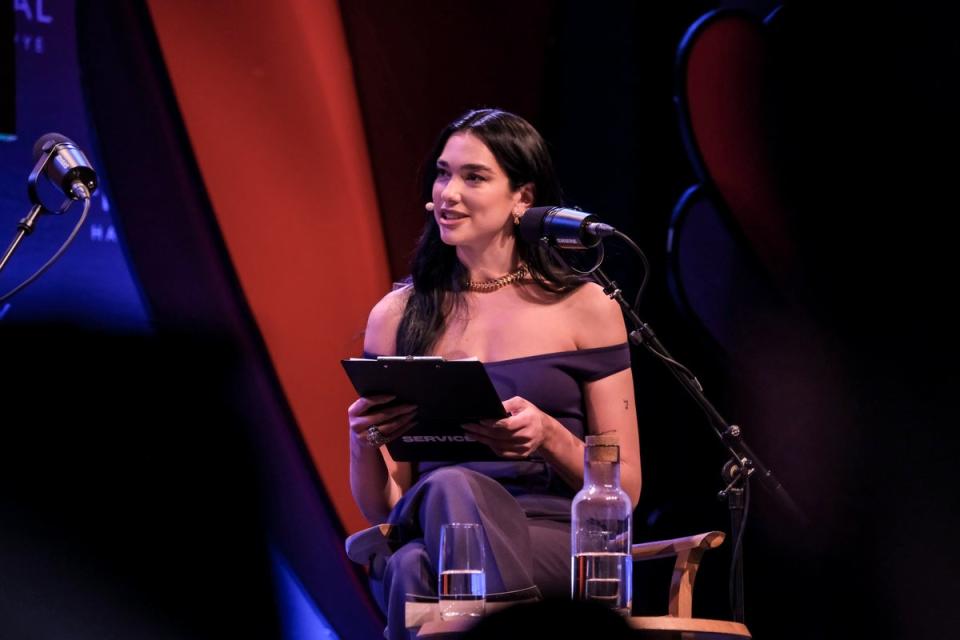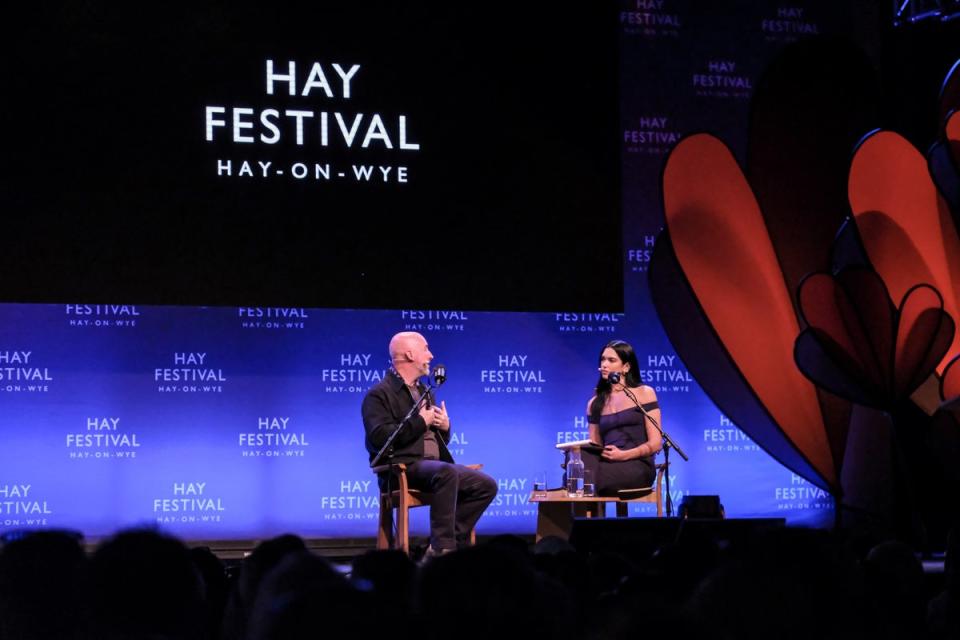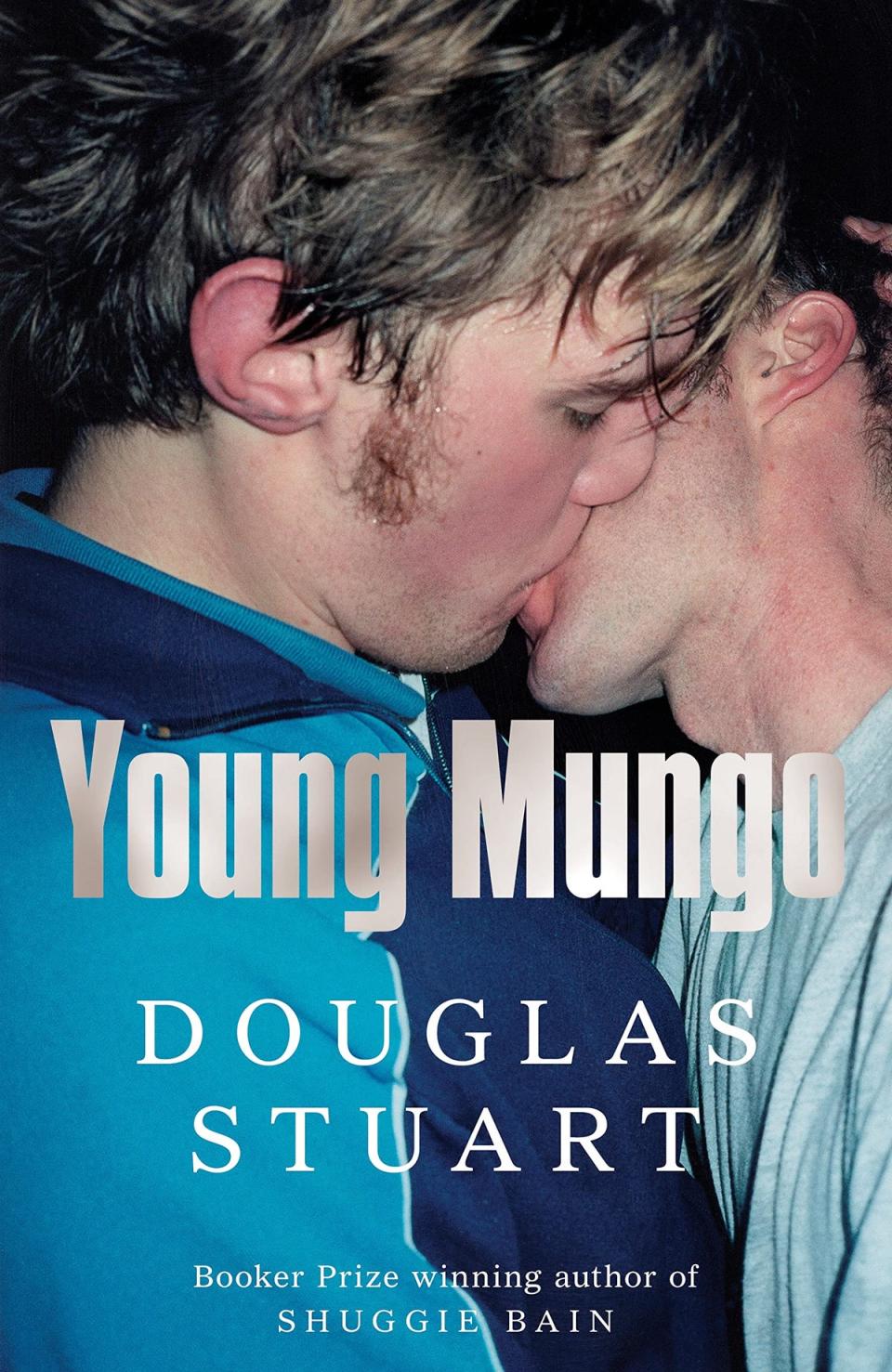Dua Lipa and Douglas Stuart at Hay Festival: “Reading has always been a form of escapism for me”

Rarely has a crowd at a literary festival been as excitable as the one welcoming pop icon Dua Lipa to the Bailie-Gifford Stage at Hay-on-the-Wye on June 3.
The six-time Brit Award and three-time Grammy Award winner invited novelist Douglas Stuart to join her for a live recording of her podcast, Dua Lipa: At Your Service. The pair discussed his award-winning debut novel, Shuggie Bain, which won the Booker Prize in 2020 – the same ceremony where Lipa delivered the keynote address last year.
“Reading has always been a form of escapism for me and I love nothing more than sharing that experience with friends,” Lipa told the Evening Standard. “I had heard wonderful things about how welcoming the [Hay] community was and seeing how passionate everyone involved in the festival is about reading – from the speakers to the staff and audience members – was so inspiring.”
Lipa chose Stuart’s Shuggie Bain as her first Book of the Month for the newly-launched Book Club on her lifestyle platform, Service95. “Starting the book club was a no brainer for me,” she said at the festival on Sunday, in conversation with Gaby Wood, a fellow of the Royal Society of Literature and the literary director of the Booker Prize Foundation. “If I can share my love of reading with people, I feel like I’m on the right track.”
Hot on the heels of her collection for Versace, and looking ahead to the Barbie movie premiere, Lipa is not your typical Hay panellist. But she was perfectly cast opposite Stuart, whose magnum opus came out but a month before hers. Shuggie Bain was a finalist in a slew of literary competitions and a bestseller in 39 countries, while Lipa’s Future Nostalgia was nominated for a Mercury Prize and is currently the sixth most streamed album of all time on Spotify.
Stuart was raised by a single mother on a council estate in post-industrial Glasgow: she died when he was only sixteen from alcohol-related health issues, and he moved to New York to work in fashion after studying textiles at university. Though Lipa’s upbringing in West Hampstead was ostensibly more comfortable, her ride hasn’t exactly been plain sailing.
Raised by Kosovan parents, Lipa – whose first name means ‘love’ in Albanian – revealed that she “understood the duality of [her] heritage at an early age.” Her family moved back to Kosovo following the declaration of independence in 2008, and she returned to London alone for sixth form, she told the Hay audience, living with a family friend who was studying at LSE.
Both Stuart and Lipa know a thing or two about growing up quicker than those around them, and have the aura of people who’ve always been wiser and more mature than most. In Shuggie Bain, a novel largely inspired by his own childhood, Stuart revisited the circumstances that forced him into early adulthood.
“It was traumatic,” the novelist confessed to the audience. “I only found catharsis after it was published, because of the connection that it gave me to strangers who related to the novel or recognised people they knew in it.” He admitted: “It made me feel much less lonely.”
“The book wouldn’t let me give up on it because it was so integral to me as a person,” Stuart reflected. He suffered early setbacks: his husband took eight months to read the first draft, 1,800 pages long, and returned it with a slew of suggested redactions. “I didn’t speak to him for seven weeks after that,” Stuart laughed.
Shuggie Bain is set apart by its singular vision. “I was raised by a single mother, and my entire network was feminine, so I set out to write about the same kind of landscape, but from a feminine perspective,” Stuart revealed.
The novelist was careful not to descend into cliché. The idea of working class solidarity, as touted in Billy Elliot, came under scrutiny. “That solidarity is a result of non-conformity,” he said.
The conformity he described – “being a good mother, going to chapel, putting your kids first” – was far removed from the reality which he and Shuggie both endured. “As a child I was witness to things that a child should never see,” the author confessed.
A gay writer from a working class background, Stuart stands in a league of his own; but to him, this is only a reminder of the progress that still needs to be made. “Young working class men still have a tough time coming to books,” he remarked. Stuart also highlighted the importance of book champions like Lipa.

“I have so much respect for Dua,” the author said. “I love the work she does to bring readers, especially young readers, to literature, and how infectious it is when she uses her influence to spread the joy of reading.”
Speaking to Wood the next day, Lipa traced her own love of reading back to the texts which she said had shaped her. “I have a track record for emotionally traumatic books,” Lipa laughed, singling out Malorie Blackman as her favourite author growing up.
Noughts & Crosses, the bestselling series that reimagines modern day Britain under reversed Jim Crow laws, was Lipa’s “first step towards understanding racism and classism at a time when [she] was starting to figure out the world.” Another seminal text in her life was Milan Kundera’s 1984 masterpiece, The Unbearable Lightness of Being, which she read while touring in the aftermath of a breakup. “It helped me get through it,” she said.
“I’d been with someone who had a very different idea of fidelity than I had,” she added. But the Czech novel “offered [her] a view into other experiences of relationships.” The main character, Tomáš, considers sex and love to be distinct entities: he has sex with many women but loves only his wife, and sees no contradiction between these positions. “A rather unapologetic philosophy on monogamy,” Lipa laughed.
But it’s the theme of unconditional love towards which she returns when she picks up a book. Whether it’s The Road by Cormac McCarthy, Hanya Yanagihara’s A Little Life, or indeed Shuggie Bain, Lipa is obsessed with stories that are “harrowing and tragic”, but teach us how to find “the through line of love within them,” she told the Hay audience.
The superstar’s advocacy of books comes as global reading and literacy rates continue to plummet. Though she tended to recommend emotional heavyweights, she also cautioned that “keeping the fire of reading alive is also about reading what you enjoy.
“It’s okay not to force yourself through a book that you don’t connect with,” the singer added.

That rallying cry for reading also struck a chord with Stuart. “I didn’t start reading until I was about 17,” he revealed. “Books were dangerous; they felt like they belonged to a society that was down south, middle class, and feminine, so I was scared that reading would out me.”
“Books are dangerous,” Lipa concurred, “also because the words we choose can change how we view the world.” Lipa expanded on the danger of quashing certain voices and spoke out against the censorship of queer writers “in American libraries.” When asked about contemporary editors censoring words deemed too offensive in Roald Dahl, she said: “Art shouldn’t be changed, but spoken about.”
Dahl cropped up in her conversation with Wood too, when a child in the audience asked which book from her own childhood she thinks of as having the most powerful message. “The Twits,” Lipa smiled. “It teaches you that beauty comes from within.”
Lipa’s mission stretches far beyond book fairs and picturesque Powys: last week before the festival, she visited HMP Downview together with Wood to volunteer with a women’s reading group. She shared the story of a female prisoner who had never read a book before her incarceration. “Before she went to prison, she told us she’d never thought about how anyone else felt,” Lipa revealed. “Reading changed the way she saw the world.”
This rang true for Stuart too, whose love of reading at 17 broadened his horizons beyond Glasgow. However, he struggled to see how he fit into the brave new world he was encountering. After reading the classics, he turned to working-class and queer writers, but found that “the queer voices were overwhelmingly aristocratic,” he laughed.
His own voice turned out resoundingly authentic: Shuggie Bain is written entirely in Glaswegian dialect, which Lipa laughed about practicing while reading the book aloud in her room. It is currently being adapted for TV, though Stuart noted the writer’s strikes had stalled development. “I hope they resolve it soon,” he said.
He wants to find “young, native working-class actors from Glasgow” who can bring his book to life “with an authentic voice.” The writer indicated that he was keenly involved in the project, noting that he was highly influenced by cinema – he cited Andrea Arnold, Lynne Ramsey and Ken Loach as influences, describing the latter as “one of the great working-class voices.”
Alongside Shuggie Bain, his second novel, Young Mungo (published last year to acclaim) is being made into a TV show, it was announced in March. “I felt much more confident with Mungo,” Stuart told Hay Festival. “I knew I was writing about first love and sexual violence and it came out as a much more structured book.”

Young Mungo had been finalised by the time Stuart was pitching Shuggie Bain to publishers. Why, one audience member asked, did he insist on first publishing a novel that was messier, more challenging, and harder to sell?
“Shuggie was the project of my heart and the portrait that I wanted to create,” Stuart smiled. His words, intended as a rallying cry for working-class voices in the arts, had a universal ring – like his characters, drawn from the particulars of post-industrial Scotland but speaking to an audience far beyond it – “If you want to see more of something in the world, support it. That’s the best you can do.”
Universal appeal is something Lipa understands all too well. Many in the audience were here for her alone; one fan flew all the way from Israel, travelling 3,000 miles. “I already have two Dua Lipa tattoos, can you help me out with the third?” she asked the pop star before a stunned audience.
Without a hint of snootiness, Lipa brushed off the excitement that inevitably surrounds her calibre of celebrity. “She’s here today as a reader,” Wood said as she rounded off her introduction of the megastar. It’s become something of a trope for artists to reinvent themselves so early on in their careers; but Lipa’s turn as a bookworm with a purpose is as genuine as they come.
Hay Festival, hayfestival.com

 Yahoo Sport
Yahoo Sport 





































